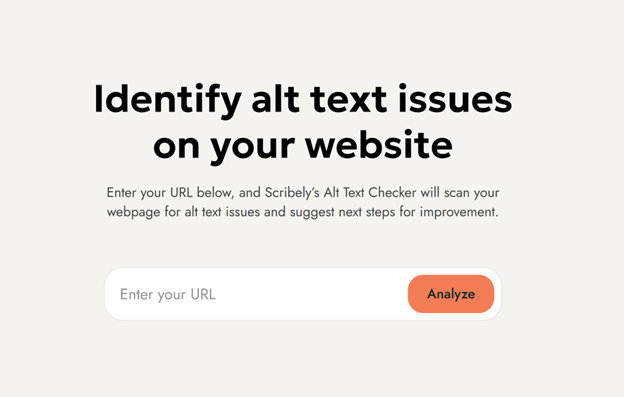Introduction
The European Accessibility Act (EAA) is a European directive that became law in 2019. It aims to standardize accessibility requirements for private-sector companies that sell products and services in the European Union. We are less than a year away from June 28, 2025, which is the date when compliance enforcement begins. With this timeline set in place, we aim to provide a resource on what exactly this law means, how it affects digital accessibility, what’s happening in the United States, and how Scribely can help in the process.
How Accessibility Impacts End Users
Dates and compliance standards are surely important, but it’s also vital to showcase how the European Accessibility Act will impact end users. The EAA is all about making information, products, and services accessible rather than simply meeting the standards for compliance. But if you’re looking for specific information about how to be compliant, expand the sections below.
When it comes down to it, people working in the user experience space love a design challenge. There’s a distinct element of creativity involved in building online products and services. If you consider yourself one of these people, you have the creative freedom to shape how users interact with your experience in an accessible way. View the EAA not as a harsh legal checkbox that says, “you have to be compliant with this law by this time.” Instead, look at it as an opportunity to inspire your team to enhance the user experience for so many more people. Scribely ultimately views the EAA as inspiration for adopting the redesign process. Let’s let the European Accessibility Act be something to be excited about.
What is the Standard for Compliance?
EN 301 549 compliance and required documentation of accessibility statements (specifics depend on the country).
The EAA applies to commonly used hardware and software products, websites, and mobile apps. It also covers services in industries such as communication, e-commerce, finance, education, transportation, shops, restaurants, computers, mobile phones, streaming sites, business-to-business (B2B), and business-to-government (B2G) organizations (Level Access).How do European companies ensure they are following the law? First, they must show compliance with EN 301 549, which defines technical requirements related to accessibility, including the Web Content Accessibility Guidelines (WCAG) 2.1. The standard is soon to be updated to include WCAG 2.2. However, conforming with EN 301 549 alone does not ensure full compliance with the EAA. Although it depends on the country, in many nations there are laws that require organizations to publish an accessibility statement with documentation of functionality, digital accessibility specs, and contacts for submitting complaints. Some EU countries also require accessibility training for employees and close monitoring.
Consequences of Non-Compliance
Fines of up to three million euros, suspension of an organization's right to do business, and jail time of up to 18 months.
The EAA’s goal is to ensure digital products and services are accessible to everyone, which means there is punishment for non-compliance. Every European country must adopt the EAA but each can have individual standards (Level Access). A country may not enact lesser or contradictory elements of the law (hence close monitoring). These practices aim to hold companies accountable and lead to enforcement of the EAA. Specific penalties are different in each country, but there are usually fines of up to three million euros and suspension of the organization’s right to do business.
What's the Timeline?
The enforcement date is June 28, 2025 for new products, with a 5-year exemption until June 2030 for legacy products.
Although the EAA became law in 2019, organizations covered by the EAA have until June 28, 2025 to become compliant. In 2022, there were a series of implementation laws in certain states, but there is no strict enforcement date until June 2025 (Level Access). The enforcement date is June 28, 2025 for new products, with a 5-year exemption until June 2030 for legacy products (Scholarly Kitchen).With this timeline, the EAA cracks down on the private sector of businesses that may not be used to being held accountable for digital accessibility issues. The law therefore applies directly to for-profit companies in the European Union, and it also applies to organizations based outside of the EU that are selling products to Europe. Callout: All new products added to the web after June 28, 2025 must be accessible to WCAG standards; all existing products already live need to be accessible by June 2030.
America: Take Notes!
There is no comparable law or timeline like the EAA in the US, and accountability is lacking. America is behind Europe in that federal agencies are just now being held accountable with the July 2024 Section 508 Refresh Act. There is still a long way to go with establishing a directive for for-profit organizations in the US.
The EAA is by nature a law that primarily covers businesses based in Europe. It’s a unique legislation that is paving the way for healing discrepancies in digital accessibility requirements. But the EAA also applies to companies based outside of the EU that sell products or services to Europe. That means that any United States business that provides goods or services accessible to EU consumers must comply with the EAA. Specifically, private American for-profit companies with at least 10 employees and a turnover of at least two million euros (Accessibility.Works).What about all of the private for-profit businesses in the US that aren’t selling goods or services to European customers? They are not held accountable for digital accessibility issues since it’s usually a state by state issue. There have been numerous lawsuits related to digital accessibility, but there is no comparable law or timeline like the EAA in America. US for-profit businesses can still be sued for accessibility issues. Even though there isn’t a law like EAA in place, there is still an established legal precedent in US courts. But the writing is on the wall – accountability is lacking. Europe officially recognizes that websites are places of public accommodation with the EAA. The United States should acknowledge that like any other place, digital goods and services must be accessible to everyone.
Do More Than the Bare Minimum
Dates and compliance standards are surely important, but it’s also vital to showcase how the European Accessibility Act will impact end users. The EAA is all about making information, products, and services accessible rather than simply meeting the standards for compliance. But if you’re looking for specific information about how to be compliant, expand the sections below.
When it comes down to it, people working in the user experience space love a design challenge. There’s a distinct element of creativity involved in building online products and services. If you consider yourself one of these people, you have the creative freedom to shape how users interact with your experience in an accessible way. View the EAA not as a harsh legal checkbox that says, “you have to be compliant with this law by this time.” Instead, look at it as an opportunity to inspire your team to enhance the user experience for so many more people. Scribely ultimately views the EAA as inspiration for adopting the redesign process. Let’s let the European Accessibility Act be something to be excited about.

Check out Scribely's 2024 eCommerce Report
Gain valuable insights into the state of accessibility for online shoppers and discover untapped potential for your business.
Read the ReportCite this Post
If you found this guide helpful, feel free to share it with your team or link back to this page to help others understand the importance of website accessibility.







.jpg)





.jpg)


























_edited_6x4-p-1080.jpeg)


